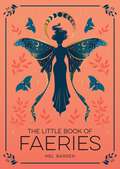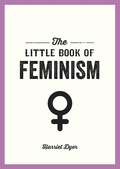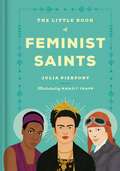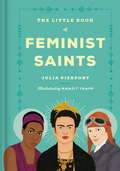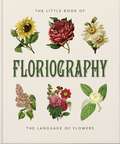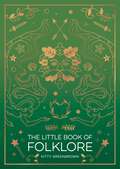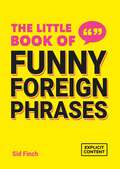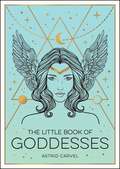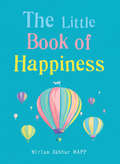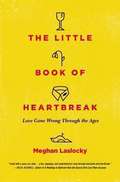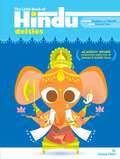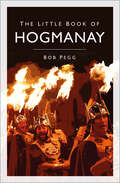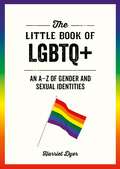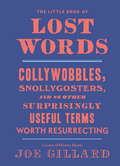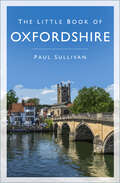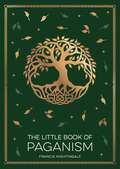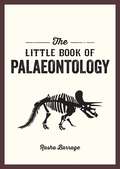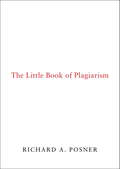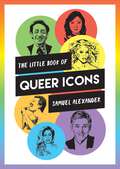- Table View
- List View
The Little Book of Faeries: An Enchanting Introduction to the World of Fae Folk
by Mel BarrenPeople have long been mesmerized by the magic and mystery of Fae folk. Step into this enchanting world of faeries, pixies, sprites and more with this beginner's guide to the essential history and mythology. Just like the creatures themselves, this book is pocket-sized and full of magic, mirth and mischief.
The Little Book of Faeries: An Enchanting Introduction to the World of Fae Folk
by Mel BarrenStep into the enchanting world of faeries, pixies, sprites and more with this beginner's guide to the history and mythology of fae folkPeople have long been mesmerized by the magic and mystery of faeries. From the winged spirits of Persian mythology to Shakespeare's forest-dwelling troublemakers, there's something about these beguiling creatures that has captured our attention for centuries. Prepare yourself for a spellbinding adventure into the faerie realm with this essential introduction to all things fae. Just like the creatures themselves, this book is pocket-sized and full of magic, mirth and mischief. Inside you will discover:- The fascinating history and origins of faerie folklore- The different characteristics and classifications of faerie, including pixies, brownies, dwarfs and more- An overview of the legendary tales that shaped how faeries are viewed across different mythologies- A summary of faerie depictions in the twentieth century and beyond, from the works of Tolkien to J. M. BarrieFor a reading experience filled with sparkle and wonder, all you need is this book, a comfortable chair, and a sprinkle of faerie dust.
The Little Book of Feminism (The\little Book Of Ser.)
by Harriet DyerDo you want to know more about the fight for women’s rights? From the rabble-rousers of the suffragist movement to the bloggers of today, this comprehensive little guide will teach you the history, theory and big issues and everything you need to know to become a CARD-CARRYING FEMINIST.
The Little Book of Feminism (The\little Book Of Ser.)
by Harriet DyerDo you want to know more about the fight for women’s rights? From the rabble-rousers of the suffragist movement to the bloggers of today, this comprehensive little guide will teach you the history, theory and big issues and everything you need to know to become a CARD-CARRYING FEMINIST.
The Little Book of Feminist Saints
by Julia Pierpont Manjit ThappThis inspiring, beautifully illustrated collection honors one hundred exceptional women throughout history and around the world. A Stylist Must-read Book of 2018 In this luminous volume, New York Times bestselling writer Julia Pierpont and artist Manjit Thapp match short, vibrant, and surprising biographies with stunning full-color portraits of secular female “saints”: champions of strength and progress. These women broke ground, broke ceilings, and broke molds—including Maya Angelou • Jane Austen • Ruby Bridges • Rachel Carson • Shirley Chisholm • Marie Curie & Irène Joliot Curie • Isadora Duncan • Amelia Earhart • Artemisia Gentileschi • Grace Hopper • Dolores Huerta • Frida Kahlo • Billie Jean King • Audre Lorde • Wilma Mankiller • Toni Morrison • Michelle Obama • Sandra Day O’Connor • Sally Ride • Eleanor Roosevelt • Margaret Sanger • Sappho • Nina Simone • Gloria Steinem • Kanno Sugako • Harriet Tubman • Mae West • Virginia Woolf • Malala Yousafzai Open to any page and find daily inspiration and lasting delight. Praise for The Little Book of Feminist Saints“An enticing collection of biographical portraits of extraordinary women . . . Pierpont’s pithy write-ups are accompanied by Thapp’s funky, wonderfully expressive color illustrations, making for an engaging picture-book experience for adults. . . . Bold and sassy, [this] ‘little’ collection of secular ‘saints’ stands tall: required reading for any seeking to broaden their historical knowledge.”—Kirkus Reviews (starred review)“Small enough to tuck into a bag, this delightful book offers instant inspiration.”—BookPage“A gloriously diverse, edifying, and curiosity-inspiring collection.”—Booklist
The Little Book of Feminist Saints
by Julia Pierpont'A beautifully illustrated tome honouring 100 exceptional women dating back to 630BC' RedA Stylist Must-read Book of 2018'This finely illustrated book is brimful of startling anecdotes about females who flouted traditional gender roles' Observer'Short, snappy and inspiring, these mini biographies celebrate women who headed out into the world determined to make a difference' Psychologies'Essential reading for anyone...this beautifully illustration collection...deserves to be framed in every woman's living room - an inspiration for any situation' DivaIn this luminous volume, New York Times bestselling writer Julia Pierpont and artist Manjit Thapp match short, vibrant and surprising biographies with stunning full-colour portraits of secular female 'saints': champions of strength and progress. These women broke ground, broke ceilings and broke moulds - includingMaya Angelou - Jane Austen - Ruby Bridges - Rachel Carson - Shirley Chisholm - Hillary Clinton - Marie Curie & Irene Joliot Curie - Isadora Duncan - Amelia Earhart - Artemisia Gentileschi - Grace Hopper - Dolores Huerta - Frida Kahlo - Billie Jean King - Audre Lorde - Wilma Mankiller - Toni Morrison - Michelle Obama - Sandra Day O'Connor - Sally Ride - Eleanor Roosevelt - Margaret Sanger - Sappho - Nina Simone - Gloria Steinem - Kanno Sugako - Harriet Tubman - Mae West - Virginia Woolf - Malala YousafzaiOpen to any page and find daily inspiration and lasting delight.
The Little Book of Floriography: The Secret Language of Flowers (The\little Book Of... Ser.)
by Orange Hippo!Revealing a world of secret messages contained within a single petal.Floriography – the language of flowers – is the ancient art of encoding hidden messages in the type, colour and arrangement of plants, allowing individuals to express emotions and sentiments that they may not be able to articulate through words.Featuring 100 of the most popular and available blooms from around the world, this beautifully illustrated gift book gives the botanical name for each plant, a description of its significance and place in folklore, and the story behind its meaning. It also reveals how floral symbolism has been used over the centuries in literature and art, from Hamlet's Ophelia handing out rosemary 'for remembrance' and pansies 'for thoughts', to Oscar Wilde urging his friends to wear green carnations as a subtle code for homosexuality. The idea that flowers have secret meanings would have been well understood by contemporary audiences – and we are seeing a revival of the practice today.From mimosa – which signifies chastity because its leaves close when touched – to the varied messages encoded within different colours of geraniums, Floriography offers a creative way to convey feelings and can add an extra layer of beauty and significance to a gift of flowers.The flowers in Kate Middleton's wedding bouquet signified love, happiness, gallantry and fidelity.If someone sends you a bouquet of hydrangea and lobelia, beware: they stand for heartlessness and malevolence.
The Little Book of Floriography: The Secret Language of Flowers (The\little Book Of... Ser.)
by Orange Hippo!Revealing a world of secret messages contained within a single petal.Floriography – the language of flowers – is the ancient art of encoding hidden messages in the type, colour and arrangement of plants, allowing individuals to express emotions and sentiments that they may not be able to articulate through words.Featuring 100 of the most popular and available blooms from around the world, this beautifully illustrated gift book gives the botanical name for each plant, a description of its significance and place in folklore, and the story behind its meaning. It also reveals how floral symbolism has been used over the centuries in literature and art, from Hamlet's Ophelia handing out rosemary 'for remembrance' and pansies 'for thoughts', to Oscar Wilde urging his friends to wear green carnations as a subtle code for homosexuality. The idea that flowers have secret meanings would have been well understood by contemporary audiences – and we are seeing a revival of the practice today.From mimosa – which signifies chastity because its leaves close when touched – to the varied messages encoded within different colours of geraniums, Floriography offers a creative way to convey feelings and can add an extra layer of beauty and significance to a gift of flowers.The flowers in Kate Middleton's wedding bouquet signified love, happiness, gallantry and fidelity.If someone sends you a bouquet of hydrangea and lobelia, beware: they stand for heartlessness and malevolence.
The Little Book of Folklore: An Introduction to Ancient Myths and Legends of the UK and Ireland
by Kitty GreenbrownFrom the famous Arthurian legends to monsters and faeries, The Little Book of Folklore explores the magical and mystical tales that have shaped the British Isles. Filled with stories of iconic characters like Robin Hood and Merlin, as well as lesser-known tales of giants and witches, this book is a beginner's guide to this world of myth and wonder.
The Little Book of Funny Foreign Phrases: A Collection of Creative, Hilarious and Ridiculous Sayings from Across the Globe
by Summersdale PublishersEver been stuck for a phrase that sums up exactly how you feel? These hilarious foreign expressions have got you covered in every scenario. With a variety of sayings from around the world, this entertaining compilation will equip you to insult your friends, proclaim your feelings and speak your mind in new and creative ways.
The Little Book of Funny Foreign Phrases: A Collection of Creative, Hilarious and Ridiculous Sayings from Across the Globe
by Summersdale PublishersEver been stuck for a phrase that sums up exactly how you feel? These hilarious foreign expressions have got you covered in every scenario. With a variety of sayings from around the world, this entertaining compilation will equip you to insult your friends, proclaim your feelings and speak your mind in new and creative ways.
The Little Book of Goddesses: An Empowering Introduction to Glorious Goddesses
by Astrid CarvelEmbrace the power of the divine in this beginner’s guide to some of mythology’s fiercest females and most legendary ladiesAcross thousands of years and countless civilizations, goddesses have been a powerful presence. Whether as leaders, mothers, warriors or lovers, these indomitable divinities have always been able to fascinate and seduce us.This pocket guide offers readers an engaging and accessible introduction to a selection of the most powerful and influential goddesses throughout ancient and modern history, retelling their stories and celebrating their awesome abilities. Each profile includes a concise history of the goddess and her origins, a summary of her main powers, a look at the goddess in myth and popular culture and an exploration of her best attributes.Learn about the Athena, the Greek goddess of wisdom and war; Bastet, the Egyptian goddess of pleasure and protection; the beautiful Freyja, the Norse goddess of love, and many others.Let yourself be inspired and empowered by tales of feminine power, strength and wisdom in this pocketbook of dazzling deities.
The Little Book of Goddesses: An Empowering Introduction to Glorious Goddesses
by Astrid CarvelEmbrace the power of the divine in this beginner’s guide to some of mythology’s fiercest females and most legendary ladiesAcross thousands of years and countless civilizations, goddesses have been a powerful presence. Whether as leaders, mothers, warriors or lovers, these indomitable divinities have always been able to fascinate and seduce us.This pocket guide offers readers an engaging and accessible introduction to a selection of the most powerful and influential goddesses throughout ancient and modern history, retelling their stories and celebrating their awesome abilities. Each profile includes a concise history of the goddess and her origins, a summary of her main powers, a look at the goddess in myth and popular culture and an exploration of her best attributes.Learn about the Athena, the Greek goddess of wisdom and war; Bastet, the Egyptian goddess of pleasure and protection; the beautiful Freyja, the Norse goddess of love, and many others.Let yourself be inspired and empowered by tales of feminine power, strength and wisdom in this pocketbook of dazzling deities.
The Little Book of Happiness: Simple Practices for a Good Life
by Miriam Akhtar GAIABOOKS INC.What is happiness? What can we do to be happier? Why does happiness matter?In this beautifully illustrated little book, leading Positive Psychologist Miriam Akhtar introduces us to the key ingredients of a well-lived and fulfilling life.Drawing on her expert knowledge of the Science of Happiness, the author shares 12 evidence-based Happiness Habits and the key practices that will help us obtain and sustain happiness in our daily lives - such as connecting with others, feeling gratitude, spending time in nature, being mindful, savouring the moment and practising positive emotion.Bursting with practical, accessible tools and easy-to-follow exercises, this little book offers readers invaluable advice on how to create the best conditions for a happy life, well lived.
The Little Book of Happiness: Simple Practices for a Good Life
by Miriam AkhtarWhat is happiness? What can we do to be happier? Why does happiness matter?In this beautifully illustrated little book, leading Positive Psychologist Miriam Akhtar introduces us to the key ingredients of a well-lived and fulfilling life.Drawing on her expert knowledge of the Science of Happiness, the author shares 12 evidence-based Happiness Habits and the key practices that will help us obtain and sustain happiness in our daily lives - such as connecting with others, feeling gratitude, spending time in nature, being mindful, savouring the moment and practising positive emotion.Bursting with practical, accessible tools and easy-to-follow exercises, this little book offers readers invaluable advice on how to create the best conditions for a happy life, well lived.
The Little Book of Heartbreak: Love Gone Wrong Through the Ages
by Meghan LaslockyThe perfect anti valentine for any lovelorn friend, this guide of hearbreak through the ages allows the broken hearted to read through the pain. From divorce cases in ancient Rome to the art of crafting a perfect getting over someone CD, this is a whirlwind tour through love's most crushing moments including how Ernest Hemingway cheated on his wife and then stole her job, Morrisey's personal creed about how sex is useless and what to read, listen to and watch to forget an ex as fast as possible.
The Little Book of Hindu Deities: From the Goddess of Wealth to the Sacred Cow
by Sanjay PatelPixar animator and Academy Award–nominated director Sanjay Patel (Sanjay&’s Super Team) brings to life Hinduism&’s most important gods and goddesses—and one sacred stone—in fun, full-color illustrations, each accompanied by a short, lively profile. The Little Book of Hindu Deities is chock-full of monsters, demons, noble warriors, and divine divas. Find out why Ganesha has an elephant&’s head (his father cut his off!); why Kali, the goddess of time, is known as the &“Black One&” (she&’s a bit goth); and what &“Hare Krishna&” really means.&“Throw another ingredient in the American spirituality blender. Pop culture is veering into Hinduism.&”—USA Today
The Little Book of Hogmanay
by Bob PeggDid You Know?No one knows the origin of the word Hogmanay.Until late in the twentieth century, Hogmanay was celebrated on two distinct dates, twelve days apart.On the island of Islay, it was a Hogmanay custom to predict who you would marry by throwing fish at the wall.There is more to Hogmanay than fireworks – firstfooting, Guisers, thiggers, mass ball games, clavies and the Dingwall Crate all feature within. Oh, and don’t forget to look out for the Trows!The Little Book of Hogmanay is a feast of information exploring the history, folklore, tales, food, drink and traditions of Hogmanay, from its pagan roots to its celebratory present.Whether you need a user’s guide or an anthology of entertainment, The Little Book of Hogmanay will tell you all you ever wanted to know about Scotland’s most widely and wildly celebrated festival.
The Little Book of LGBTQ+: An A–Z of Gender and Sexual Identities
by Harriet DyerFeel confident in the ABCs of LGBTQ+Language is a key path to awareness, acceptance and empowerment. It’s central to understanding the world and the communities we live in, but it can often be tricky to keep up with correct and ever-evolving terminology.This easy-to-use dictionary introduces the most essential vocabulary surrounding LGBTQ+ identities. Whether you’re questioning your own identity or simply interested in learning more, this useful guide will help you navigate the world with knowledge, understanding and kindness.
The Little Book of Lost Words: Collywobbles, Snollygosters, and 86 Other Surprisingly Useful Terms Worth Resurrecting
by Joe GillardThe founder of History Hustle presents a handy guide for expressing yourself with history's best words. This collection features scores of unique words from history that deal with surprisingly modern issues like sleeping in and procrastination--proving that some things never change! The Little Book of Lost Words presents each term that's ready to be brought back into modern-day use, complete with definition, hilarious sample sentence, and cheeky historical art. You'll learn new words for the cozy room where you like to Netflix and chill (snuggery), for a dishonest politician (snollygoster), and for a young person who sleeps through the day and doesn't work (dewdropper). If you like Lost in Translation, Shakespeare Insult Generator, Drunk History, and Roald Dahl--and you delight in the way words like blatteroon and flapdoodle roll off the tongue--then you're the word lover this book was written for. Want to know what a fizgig or groke is? Read this book!
The Little Book of Oxfordshire
by Paul SullivanDid you know?A trip to the Ashmolean for Alice Liddell and Charles Dodgson led to the latter, under his nom de plume Lewis Carroll, immortalizing both Liddell and himself (as a dodo) in the Alice books.A man was crushed beneath his own cart wheels in 1872, when his horse reared after meeting an elephant on the road from Oxford to Eynsham.Despite Percy Bysshe Shelley being expelled from University College for writing the pamphlet ‘The Necessity of Atheism’, he is now its most celebrated alumnus.The Little Book of Oxfordshire is a funny, fact-packed compendium of the sort of frivolous, fantastic or simply strange information no one will want to be without. Here we find out about the most unusual crimes and punishments, eccentric inhabitants, and hundreds of interesting facts (plus some authentically bizarre bits of historical trivia).Combining essential details with little-known and entertaining information and quotations, this book is a highly engaging guide to where you are, what to look out for now you’re here, and how on earth all this came to be.
The Little Book of Paganism: A Modern Introduction to Ancient Spiritual Practices
by Francis NightingaleStep into the magical realm of paganism with this enchanting beginner's guide to the religions of old. From druidry to shamanism to modern witchcraft and Wicca, paganism is steeped in history, legend and ancient tradition, and is now one of the fastest-growing religions.
The Little Book of Palaeontology: The Pocket Guide to Our Fossilized Past
by Rasha BarrageIf you want to know your ichthyosaur from your iguanodon, and your belemnites from your brachiopods, strap in for this whirlwind tour of the highlights of palaeontology Life as we know it now has a long history, buried beneath the ground. Palaeontology is the science of fossilized animals and plants, using discoveries of ancient lifeforms to uncover secrets of the past. From giant dinosaurs, to ammonites, to the first ever humans, explore the greatest findings in palaeontology in this pocket-sized introduction. The Little Book of Palaeontology includes:- The key palaeontological discoveries over the past 400 years, including the dinosaur found complete with intricate scales, and the largest fossil ever uncovered- Profiles of influential palaeontologists such as Jack Horner, Dong Zhiming and Mary Anning- What we have learnt about the lives of ancient creatures and how they became extinct- The big questions about the prehistoric world that palaeontologists are trying to answer todayThis illuminating little book will introduce you to the key thinkers, themes and theories you need to know to understand how life evolved. Look through this window to the past and learn about our prehistoric ancestors and the creatures of a bygone age.
The Little Book of Plagiarism
by Richard A. PosnerA concise, lively, and bracing exploration of an issue bedeviling our cultural landscape–plagiarism in literature, academia, music, art, and film–by one of our most influential and controversial legal scholars. Best-selling novelists J. K. Rowling and Dan Brown, popular historians Doris Kearns Goodwin and Stephen Ambrose, Harvard law professor Charles Ogletree, first novelist Kaavya Viswanathan: all have rightly or wrongly been accused of plagiarism–theft of intellectual property–provoking widespread media punditry. But what exactly is plagiarism? How has the meaning of this notoriously ambiguous term changed over time as a consequence of historical and cultural transformations? Is the practice on the rise, or just more easily detectable by technological advances? How does the current market for expressive goods inform our own understanding of plagiarism? Is there really such a thing as “cryptomnesia,” the unconscious, unintentional appropriation of another’s work? What are the mysterious motives and curious excuses of plagiarists? What forms of punishment and absolution does this “sin” elicit? What is the good in certain types of plagiarism? Provocative, insightful, and extraordinary for its clarity and forthrightness,The Little Book of Plagiarismis an analytical tour de force in small, the work of “one of the top twenty legal thinkers in America” (Legal Affairs), a distinguished jurist renowned for his adventuresome intellect and daring iconoclasm.
The Little Book of Queer Icons: The Inspiring True Stories Behind Groundbreaking LGBTQ+ Icons
by Samuel AlexanderDiscover the fascinating stories behind 38 queer icons, all of them ground-breakers, risk-takers and game-changers. Whether they are activists, sportspeople, scientists or superstars, every one of these people has been a trailblazer in their field, and deserves to have their achievements celebrated the world over. Be empowered and inspired by their extraordinary life stories, their awesome achievements and their wonder-words of wisdom with this pocketbook of remarkable people, and prepare to be introduced to your new superheroes.
